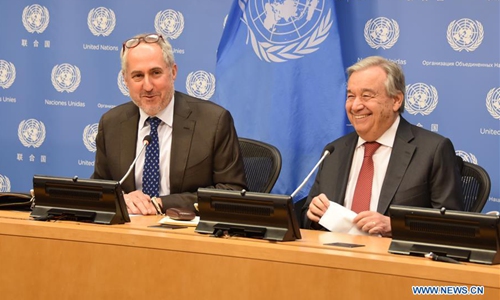HOME >> WORLD
Guterres stresses UN role as guardian of international law in Mideast
Source:AFP Published: 2020/2/5 18:13:40
Guterres: UN safeguards international law in Mideast
Secretary-General Antonio Guterres on Tuesday emphasized the UN's role as the guardian of international law in the Israeli-Palestinian conflict, days before US President Donald Trump's son-in-law is to present a new Mideast plan to the Security Council.

"Our position is very clear. We are the guardians of the UN resolutions and international law in relation to the Palestinian question," Guterres told a wide-ranging news conference at the United Nations headquarters.
"We are totally committed to the two-state solution," he added, reiterating his stance that the plan must be based on pre-1967 borders.
The US plan makes numerous concessions to Israel, proposing the establishment of a Palestinian capital in Abu Dis, a suburb of Jerusalem. The Palestinians have long sought the whole of east Jerusalem as their capital.
The US proposal also gives consent for the annexation of Israeli settlements as well as the Jordan Valley, Palestinian territories occupied by Israel since 1967.
The Palestinians, who have strongly criticized Trump's plan, on Tuesday submitted a draft resolution through Tunisia and Indonesia, two nonpermanent members of the Security Council.
The draft "strongly regrets" that the Trump plan "breaches international law" and UN resolutions.
It also "undermines the inalienable rights and national aspirations of the Palestinian people, including to self-determination and independence," the draft says.
It is expected to be submitted to a vote in the Security Council on Tuesday, coinciding with a visit of Palestinian President Mahmoud Abbas.
The United States would likely oppose it, using its veto if necessary, should it gain the support of the minimum nine council members required for passage.

United Nations Secretary-General Antonio Guterres (R) attends a press conference on UN work priorities for 2020 at the UN headquarters in New York, on Feb. 4, 2020. Antonio Guterres said Tuesday that the organization is totally committed to the two-state solution to the Israeli-Palestinian conflict. (Xinhua/Wang Jiangang)
"Our position is very clear. We are the guardians of the UN resolutions and international law in relation to the Palestinian question," Guterres told a wide-ranging news conference at the United Nations headquarters.
"We are totally committed to the two-state solution," he added, reiterating his stance that the plan must be based on pre-1967 borders.
The US plan makes numerous concessions to Israel, proposing the establishment of a Palestinian capital in Abu Dis, a suburb of Jerusalem. The Palestinians have long sought the whole of east Jerusalem as their capital.
The US proposal also gives consent for the annexation of Israeli settlements as well as the Jordan Valley, Palestinian territories occupied by Israel since 1967.
The Palestinians, who have strongly criticized Trump's plan, on Tuesday submitted a draft resolution through Tunisia and Indonesia, two nonpermanent members of the Security Council.
The draft "strongly regrets" that the Trump plan "breaches international law" and UN resolutions.
It also "undermines the inalienable rights and national aspirations of the Palestinian people, including to self-determination and independence," the draft says.
It is expected to be submitted to a vote in the Security Council on Tuesday, coinciding with a visit of Palestinian President Mahmoud Abbas.
The United States would likely oppose it, using its veto if necessary, should it gain the support of the minimum nine council members required for passage.
Posted in: MID-EAST,WORLD FOCUS